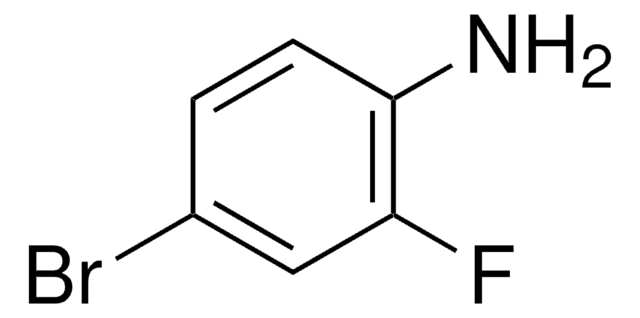All Photos(1)
About This Item
Linear Formula:
C6H5C6H3(Br)F
CAS Number:
Molecular Weight:
251.09
EC Number:
MDL number:
UNSPSC Code:
12352100
PubChem Substance ID:
Recommended Products
Assay
99%
form
solid
mp
39-41 °C (lit.)
SMILES string
Fc1cc(Br)ccc1-c2ccccc2
InChI
1S/C12H8BrF/c13-10-6-7-11(12(14)8-10)9-4-2-1-3-5-9/h1-8H
InChI key
HTRNHWBOBYFTQF-UHFFFAOYSA-N
Signal Word
Warning
Hazard Statements
Precautionary Statements
Hazard Classifications
Acute Tox. 4 Oral - Aquatic Acute 1 - Aquatic Chronic 1 - Eye Irrit. 2 - Skin Irrit. 2
Storage Class Code
11 - Combustible Solids
WGK
WGK 3
Flash Point(F)
>230.0 °F - closed cup
Flash Point(C)
> 110 °C - closed cup
Personal Protective Equipment
dust mask type N95 (US), Eyeshields, Gloves
Certificates of Analysis (COA)
Search for Certificates of Analysis (COA) by entering the products Lot/Batch Number. Lot and Batch Numbers can be found on a product’s label following the words ‘Lot’ or ‘Batch’.
Already Own This Product?
Find documentation for the products that you have recently purchased in the Document Library.
Comparison of the properties of liquid crystals derived from certain lateral halogeno-substituted azomethines.
Brown JW, et al.
Mol. Cryst. Liq. Cryst., 159(1), 255-266 (1988)
Synthesis of 4-Bromo-2-fluorobiphenyl by Suzuki Coupling Reaction with Pd (PPh_3) _4 Catalysis.
Gao F-q, et al.
Fine Chemicals / ????, 11, 023-023 (2012)
The Research on the Synthetic Craft of 4-Bromo-2-Fluoro Biphenyl.
Wang C-l, et al.
Journal of Jiangxi Normal University (Natural Science Edition), 2, 010-010 (2007)
Ou-Ya Zhao et al.
Chemosphere, 174, 774-780 (2017-02-16)
The present study used strain ZH-H2 (Fusarium sp.) isolated by our group as the PAH-degrading strain and 5-6-rings PAHs as degradation objects. The soil incubation experiment was carried out to investigate the starch-enhanced degradation effects of HMW PAHs by Fusarium
Xiaoxue Zhang et al.
Environmental science and pollution research international, 27(34), 42969-42978 (2020-07-30)
The capacity of Fusarium sp. strain ZH-H2 to secret lignin peroxidase (LiP), laccase (Lac), and manganese peroxidase (MnP) and degrade high molecular weight polycyclic aromatic hydrocarbons (HMW-PAHs) was studied. When the fungus was grown in control mineral salt medium for
Our team of scientists has experience in all areas of research including Life Science, Material Science, Chemical Synthesis, Chromatography, Analytical and many others.
Contact Technical Service









